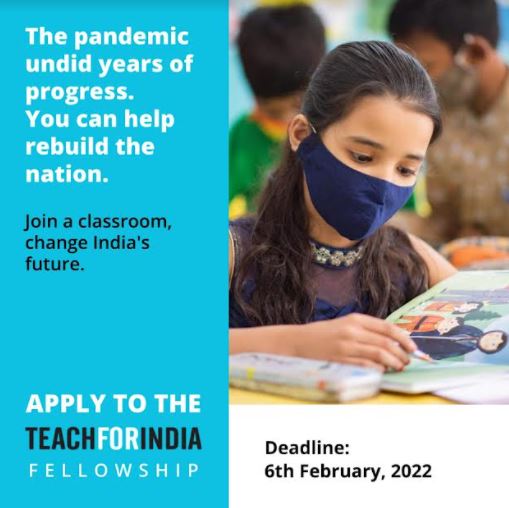The Teach For India Fellowship is a 2-year, full-time, paid opportunity for India’s most promising individuals, both recent graduates, and working professionals, to serve as teaching Fellows to children in some of the nation’s most under-resourced schools. Recruitment for the 2022-2024 cohort will close tomorrow, on February 6th, 2022.
Come lead a classroom, be a part of the solution – Teach For India Fellowship deadline closes on February 6th, 2022
Through two years of the ‘Leadership as Teaching‘ model, training, support, and on-ground exposure, Fellows will lead transformation change in the classroom in the short term, while developing critical leadership skills in the long term. Our Fellows will work across 260 schools across Delhi, Mumbai, Bengaluru, Pune, Hyderabad, Ahmedabad, and Chennai. The selected Fellows are placed as full-time teachers, for 2 years, in government or low-income private schools where they teach English, Mathematics, Science and Social Studies across Grades 1 to 10.
On the completion of this 2-year Fellowship, Teach For India Fellows become a part of a 4000+ members strong Alumni network of sector leaders and changemakers, which includes Safdar Rahman (Director of critically acclaimed film Chippa on Netflix); Anurag Kundu (Chairperson, Delhi Commission for Protection of Child Rights); Sharmili Phulgirkar (Senior Vice President, Citi); Aniket Doegar (Founder of Haqdarshak); Arja Dayal (Country Director, Innovations for Poverty Action); and Jigyasa Labroo (Co-Founder Slam out loud)
“What I find very attractive about Teach For India Fellowship is that it has the potential to change the educational inequity in India, and it has the potential to make leaders out of the Fellows who can not only get into a good position at work or join a university of their choice but transform their lives,” Arnavaz Aga, Founder Trustee – Teach For India.
In 2021, only 8.3% of the applicants who applied were selected. It has welcomed candidates from colleges such as Anna University (Chennai), NIT Suratkal (Mangalore), Stella Maris College (Chennai), St. Xavier’s College (Mumbai), The Maharaja Sayajirao University of Baroda, St. Stephens College (Delhi University) Thakur College of Science and Commerce (Mumbai), Patkar Varde College (Mumbai), University of Mysore, IIT Guwahati, University of Calcutta, Denison University (Ohio, US) and Leeds Beckett University among others. Fellows hail from corporations such as Citigroup, Deloitte, EY, Thomson Reuters, Citigroup, Tata Group, Wipro, and JP Morgan Chase.
Teach For India Alumni have widespread reach as they are cumulatively reaching more than 33 million children – or 1 in 10 children in India – through their work across schools, communities, policy, and various levels of the system
Now more than ever, we need young Indian citizens who can drive transformational change in the classrooms. Young people who will work closely with children with the greatest need, offer them opportunities towards a better future – and do all of this while pushing their own boundaries of leadership and civic engagement.
To apply, please visit: apply.teachforindia.org, check out this Video of the Impact of Fellowship
About Teach For India
Teach For India places outstanding working professionals and college graduates as Fellows – who work full-time as teachers for two years in low-income and under-resourced schools. With operations in Mumbai, Delhi, Hyderabad, Chennai, Pune, Ahmedabad, and Bangalore, Teach For India has over 970 Fellows impacting more than 32,000 children across the country. Post Fellowship, they join a growing movement of over 4000+ Alumni working at all levels of the education sector. A part of a global Teach For All network of 60 countries, with a shared vision of an excellent education for all children, Teach For India’s mission is to end educational inequity in India by creating a strong pipeline of driven, skilled talent within the educational ecosystem.



